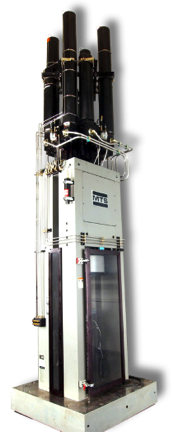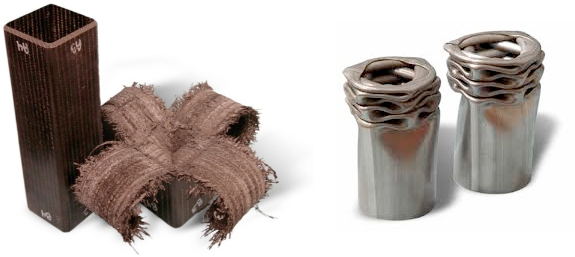Crashworthiness of Carbon Fiber Composites
Test Machine for Automotive Crashworthiness (TMAC)
The ORNL Composites Laboratory operates a unique servo-hydraulic test machine, the integrated physical and virtual Test Machine for Automotive Crashworthiness (TMAC), to conduct progressive crushing tests on composite automotive components at velocities ranging from 0-29 km/hr and energy levels up to 50 kJ. TMAC is a closed-loop servo-hydraulic machine with 1600 gallon per minute servo-valve system. It was designed and manufactured by MTS in collaboration with the Automotive Composites Consortium (ACC) and ORNL. TMAC is used for controlled, progressive crush experiments at programmable velocity profiles and high force levels. The capability to maintain constant speed is important to keep the crush rate constant and to control the rate effects.
TMAC

Physical Specifications
- 490 KN Actuator Capacity (static conditions)
- 250 mm Stroke
- Greater than 490 KN side-load capacity
- Attachable 450 kg mass to smooth impact oscillations
Example Operating Conditions
- No Load: 115 mm travel at 8 m/s
- Sustained force of 133 KN: 115 mm travel at 6 m/s
- Sustained force of 267 KN: 115 mm travel at 4 m/s
Using this machine, we can study the deformation and failure response of composite components in relation to impact velocity in a controlled and programmable manner made possible by a unique adaptive control feature of the software. TMAC is principally used to test composite structures, but it is also a superb tool for conducting progressive crush tests on other structural materials. The capability to test across this range of velocities and energy levels is providing the critical data needed for crash simulations that assess the safety of vehicles body structures manufactured from composites and other high strength lightweight materials.
Crushed composite and steel specimens
